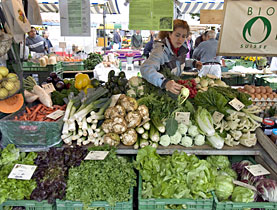Consumer habits cancel out green efforts

The Swiss are world champions when it comes to buying organic produce, according to a report on consumer behaviour released by WWF Switzerland on Monday.
It says that people are thinking more ecologically than ever before – and yet it sums up its findings under the headline “One step forward, one step back.”
“Sales of ecological products are increasing in all areas, in some cases steeply. But people are becoming more demanding about their food, housing and leisure activities, which cancels out the positive effect on the environment,” the authors of the report say.
WWF and its partners, Zurich Cantonal Bank and the Center for Corporate Responsibility and Sustainability at Zurich University (CCRS) surveyed businesses and associations as well as consumers, said Felix Meier of WWF Switzerland.
The report points to some impressive growth in ecological purchases. Sales of hybrid cars increased nearly six fold between 2004 and 2007 – but they still account for only one per cent of total new cars bought.
Even when it comes to food, organic produce makes up less than five per cent of all purchases.
“We Swiss can pat ourselves on the back and say we are buying more sustainable goods. This is very positive. But the proportion of sustainable products remains at a relatively low level,” Meier told swissinfo.
The survey showed that many people were unaware of the environmental impact of their choices. The Swiss are enthusiastic meat eaters – 73 per cent of them eat it at least three times a week. Yet the production of a kilo of meat produces about 13 times more climate-damaging gases than does the production of the same weight of noodles, the report says.
Age was not a factor when it came to choosing organic produce, Meier explained, but some behaviour did change, as people grew older.
“One thing we found was that older people – children of the 1960s, let’s say – in general naturally consume more. As a rule of thumb you can say that the more money you earn, the more of a burden you are on the environment. People tend to have a bigger apartment, which needs more energy, they go further away for their holidays.”
Consumer choice
But it is not always easy to act ecologically. About two thirds of the properties in Switzerland are rented, and tenants often do not have control over their heating, or over the appliances provided for them.
Meier suggests that everyone can nevertheless make sure that they don’t leave their computers and televisions on standby. And they may be able to persuade their landlords to buy energy-efficient equipment.
If they are forced to travel to work, they could use public transport. If none is available, they might invest in a hybrid car.
As for the argument that some people see their car as an expression of their personality, he is optimistic that advances in design are making environmentally-friendly cars more attractive.
The same applies to clothes. Not only do Switzerland’s two biggest retailers, Migros and Coop, promote organic cotton, but a number of international chains aimed at the youth market are committed to using it too.
Cotton production is extremely damaging to the environment, experts points out. The amount of water used for its cultivation and processing is more than the total water use of all the households in the world.
Fertilizer, pesticides and energy add to its detrimental impact. But consumers still put price and quality ahead of environmental considerations.
Useful tips
The report is full of useful tips. When it comes to buying food, for example, people should think about such things as the energy and water used in its production, and the distance it has travelled.
Even when it comes to investing money, people can choose options promoting social responsibility and sustainable development, the report says. The yield compares well with that on “ordinary” investments.
WWF recognises that consumers today cannot escape the pressure to buy. It recognises too that the economy can only flourish if people are willing to buy the goods it produces.
The aim of the report is to show people how they can buy intelligently and still have fun writes WWF director Hans-Peter Fricker in his introduction.
“Consumption and sustainability are not mutually exclusive,” he says.
swissinfo, Julia Slater
The report summarises the good and bad trends in Swiss consumption as follows:
Eating and drinking
Bad: meat consumption
Good: organic food
Transport
Bad: distance travelled daily
Good: choice of transport, hybrid cars
Housing
Bad: energy consumption
Good: energy saving buildings, eco-power, efficient refrigerators
Clothing
Bad: cotton sales
Good: organic cotton
The impact which different areas of consumption have on the environment breaks down as follows:
Housing 31%
Eating and drinking 30%
Transport 21%
Clothing 3%
Other 15%
(Source: ecosyntesys 2007)

In compliance with the JTI standards
More: SWI swissinfo.ch certified by the Journalism Trust Initiative











You can find an overview of ongoing debates with our journalists here . Please join us!
If you want to start a conversation about a topic raised in this article or want to report factual errors, email us at english@swissinfo.ch.